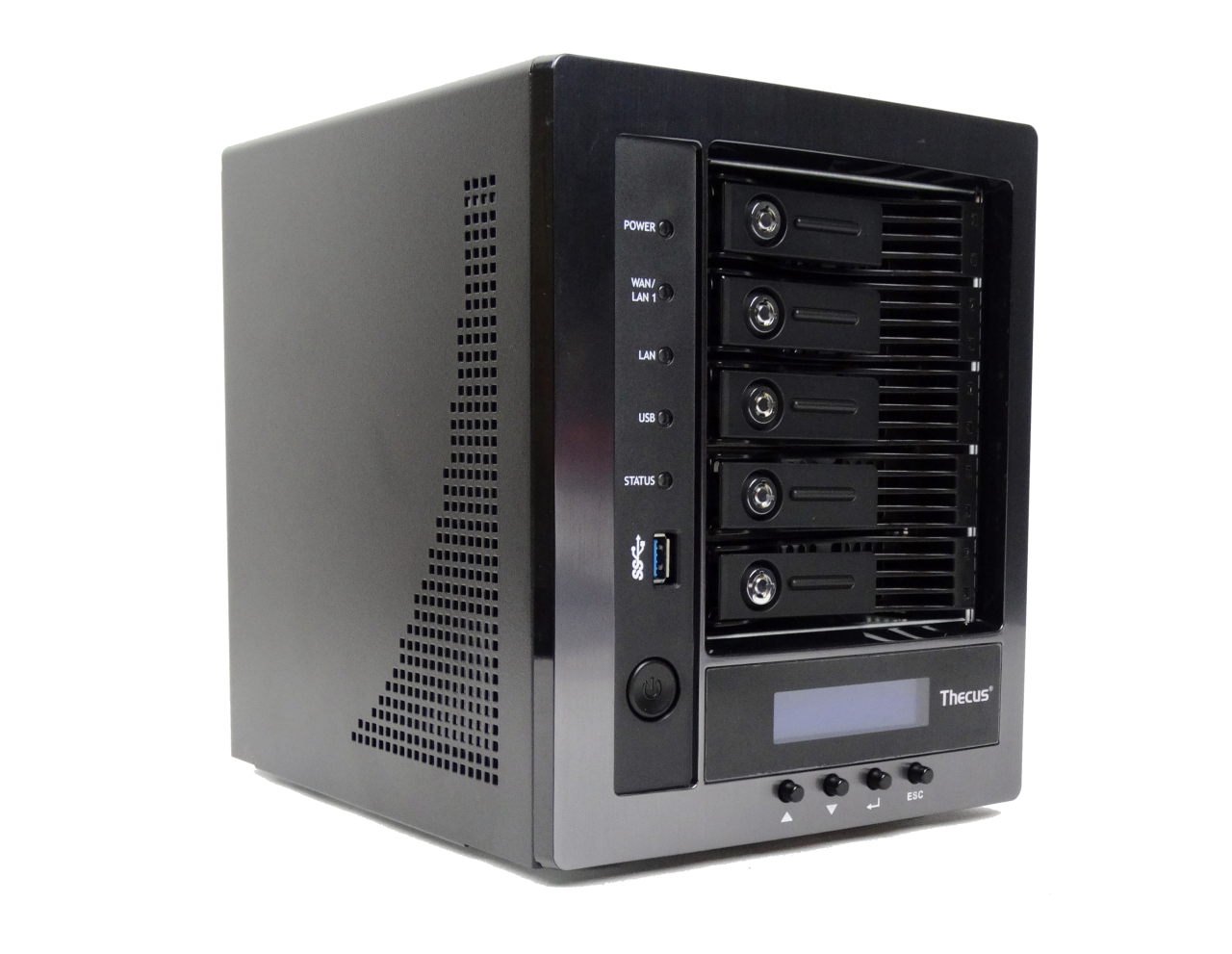Early Verdict
When used as intended, the Thecus N5810 Pro is the best option available at this time. No other product other than older Thecus models incorporates the mini-UPS battery backup system. Thecus' simple setup process allows users to be up and running in less than ten minutes and the quality ensures years of trouble free use.
Pros
- +
Only SOHO NAS with built in mini-UPS on the market. More features than most users will every use and easy setup process.
Cons
- -
The Intel Celeron J1900 is still a system on chip that lacks performance when pushed with high workloads. Latency can quickly scale up without increased throughput when working from the NAS storage space.
Why you can trust Tom's Hardware
Introduction
Thecus' N5810 Pro is the successor to the N4800, and the company's sole SMB NAS with a built-in mini-UPS battery backup system. For years, Thecus offered a single product with this capability for the small business and SOHO market. Every once in a while, it gets refreshed. The N5810 Pro is Thecus' best effort to date.
Power failures are harmful to storage products. I think it's safe to say that most of us have lost data due to a notebook running out of battery power or from a desktop shutting off unexpectedly during an electrical storm. Hard drives simply don't like losing power; it's not uncommon for them to come back online with a bad case of the click of death.
NAS products use several hard drives, so the chances of catastrophic failure multiply. If your drives do survive a power failure, then you have other issues to contend with. When power returns, the system scans the disks and attempts to repair any file system errors, bad blocks and so on. During that time, the transfer performance decreases and latency increases because the system is already performing background activities as fast as it can. With HDDs currently topping out at 10TB of capacity, it can take a long time to check the whole file system.
My family just went through a power fail event on a different NAS with twelve 6TB HDDs in RAID 6. The system is halfway full of data, so it took a long time to check everything. Since software RAID 6 consumes a lot of resources, the kids couldn't watch Blu-ray ISOs without the video skipping every few seconds. Even though the data was fairly safe thanks to redundancy, it wasn't truly available right away.
I've always wondered why Thecus is the only company with a battery backup-equipped product on the market. Most home users and small offices will not invest in a dedicated battery backup system. Building a UPS into the appliance is a step forward in the evolution of these products, and we would like to see the feature added to more products designed for home offices.
The N5810 Pro is also the first Thecus product we've tested with Btrfs (B-tree file system), a newer and more refined file system than Linux EXT4. Netgear rolled out Btrfs a year and a half ago with great success, and now Thecus offers it as an option alongside EXT3, EXT4 and XFS. Btrfs brings pooling, snapshots and checksums to the system.
Get Tom's Hardware's best news and in-depth reviews, straight to your inbox.

Chris Ramseyer was a senior contributing editor for Tom's Hardware. He tested and reviewed consumer storage.
-
Lulzon Typically battery backups are SLA (sealed lead acid) which is most likely why they don't get packaged with NAS systems - they're heavy, they're a dangerous good by transportation and shipping rules, they expand and can release gasses when under load and charged. The upside? They have way more capacity than that of a lithium-ion as shown in this little unit, they (probably) cost much less, and they last longer (5+ years vs 2-3). In terms of a NAS though, the capacity isn't really an issue if the only thing the NAS is doing is shutting down to avoid data loss/corruption.Reply -
Aris_Mp 55.3W under heavy throughput and 35.1W at idle with 5x Seagate ST500DM005 HDDs and RAID 6 configuration.Reply -
TontNZ I'm not sure if I've just missed it - but: How many drives of what brand and capacity, in what raid mode were used for the testing?Reply
It would be good to single this information out into one of the section headings. It may be redundant as you presumably standardise this across NAS of a given bay capacity - but it would still be useful. -
This is an impressive device. I'd definitively give it a try for home office solutions. The only downside I can see to it is that if the internal memory were to die (flash, ram), the backups are probably gone unless they keep using the same system/setting organization and it is forward compatible with other similar systems.Reply
5 years is a long time and unless they intend to have the same product line around for a long time, it will either be EOL or replaced with an updated version.
